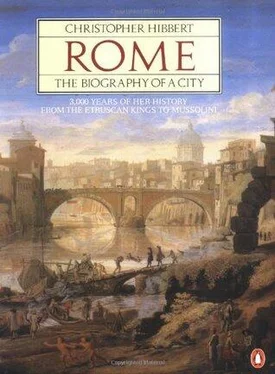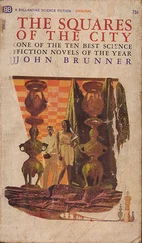Christopher Hibbert - Rome. The Biography of the City
Здесь есть возможность читать онлайн «Christopher Hibbert - Rome. The Biography of the City» весь текст электронной книги совершенно бесплатно (целиком полную версию без сокращений). В некоторых случаях можно слушать аудио, скачать через торрент в формате fb2 и присутствует краткое содержание. Жанр: Культурология, Искусство и Дизайн, на английском языке. Описание произведения, (предисловие) а так же отзывы посетителей доступны на портале библиотеки ЛибКат.
- Название:Rome. The Biography of the City
- Автор:
- Жанр:
- Год:неизвестен
- ISBN:нет данных
- Рейтинг книги:3 / 5. Голосов: 1
-
Избранное:Добавить в избранное
- Отзывы:
-
Ваша оценка:
- 60
- 1
- 2
- 3
- 4
- 5
Rome. The Biography of the City: краткое содержание, описание и аннотация
Предлагаем к чтению аннотацию, описание, краткое содержание или предисловие (зависит от того, что написал сам автор книги «Rome. The Biography of the City»). Если вы не нашли необходимую информацию о книге — напишите в комментариях, мы постараемся отыскать её.
Rome. The Biography of the City — читать онлайн бесплатно полную книгу (весь текст) целиком
Ниже представлен текст книги, разбитый по страницам. Система сохранения места последней прочитанной страницы, позволяет с удобством читать онлайн бесплатно книгу «Rome. The Biography of the City», без необходимости каждый раз заново искать на чём Вы остановились. Поставьте закладку, и сможете в любой момент перейти на страницу, на которой закончили чтение.
Интервал:
Закладка:
By then Roman domination had spread not only across the Mediterranean into north Africa but across the Adriatic into Illyria, into Spain and Syria; and Macedonia had been taken over as a Roman province, a prelude to the incorporation of Greece itself as the province of Actaea.
The influence of Greek thought and culture on life in Rome was profound. Soldiers returning from the wars, officials from eastern embassies and administrators from Greek provinces came back to Rome with admiration for Greek architects and sculptors, for Greek potters and furniture makers, for Greek teachers, philosophers and writers. Soon there was scarcely an aspect of Roman life that was not influenced to a greater or lesser extent by Greek models. Greek teachers came to Rome to instruct the young in all manner of arts and accomplishments, from language and literature, rhetoric and philosophy, to wrestling and hunting, invariably addressing their pupils in Greek which remained the language of higher education long after Latin had come to be adopted as an acceptable tongue for the teaching of grammar. Greek artists also came, and the houses of the well-to-do became filled with Greek sculptures, with copies of Greek statues especially made for the Roman market, and with cameos and jewelled ornaments made by Greek slaves and freedmen. The houses themselves were designed on lines recommended by the architects of Greece. Usually built of the local Roman stone, often faced with stucco, and roofed with flanged tiles of local clay, they consisted of a number of rooms facing on to an interior courtyard, the atrium , and had another smaller, quiet courtyard at the back, laid out as a garden, surrounded by a colonnade and known as the peristylium , a word derived from the Greek. 12
Greek gods, too, were imported into the Roman pantheon; existing Roman gods were identified with Greek equivalents, Jupiter with Zeus, for example, Venus with Aphrodite, Juno with Hera, Diana with Artemis, while new cults were introduced. In about 186 B.C. the worship of Dionysus or Bacchus, the Greek god of wine and ecstatic liberation, became widespread in Rome; reports of the orgiastic rites indulged in by the cult's converts alarmed the Roman authorities. ‘To the religious content were added the pleasures of wine and feasting, to attract a greater number,’ reported Livy, in a highly coloured account of these Bacchanalia. ‘When they were heated with wine, and all sense of modesty had been extinguished by the darkness of night and the mingling of men with women and young with old, then debaucheries of every kind began and all had pleasures at hand to satisfy the lusts to which they were most inclined.’ It was also reported that the cult was a cover for the conspiracies of revolutionary movements, so it was decreed by the Senate that the rites could not be held without permission and could then be attended by no more than five people at a time.
To most members of the Senate, old-fashioned and respectable, it seemed by the end of the second century B.C. that the Republic was already in decline. The virtues of their ancestors, their patience and resource, frugality and industry, loyalty, discipline and deep sense of responsibility had won them independence and widespread dominion. But the cost to Rome had been great. Plunder and war indemnities had brought great riches to the city; gold and silver had poured in from Spain; from the East had come luxurious curtained beds, rich coverlets, bronze couches and gorgeous furniture of a sumptuousness never before seen in Rome. The booty had been carried, and continued to be carried, in splendid processions down the Via Sacra. The victorious general, his face painted the colour of blood, marched in a gorgeous tunic, a golden crown, too heavy for him to wear, held above his head. Following him, his proud soldiers sang songs full of ribaldry and insults to their leaders, while the long lines of captives stretched back far out of sight, the most important of them, walking for the last time in the open air, soon to be executed in the cells beneath the spurs of the Capitoline hill. Behind them the chariots clattered over the stones, followed by the wagonloads of plunder, of vestments and tapestries, of gold vessels, jewelled scabbards and works of art. Yet, whereas in the past the plunder had been reserved for the city and the honour of the gods, with only a small share for the soldiers, now the army took as much as they could lay their hands on and successful generals became men of astonishing riches.
Nor was it only plunder that came to Rome. The conquest of Sicily had resulted in such vast amounts of wheat being paid in taxes that the whole population of the city could be fed on it for a considerable part of the year; and after 167 B.C. there was no need for Roman citizens themselves to pay taxes. Bakers became commonplace, whereas formerly bread had been made at home; cooks, regarded by the ancients as the lowest sort of slave, were now much in demand, and what had been considered a servile task began to be considered a fine art. With the plunder and grain, slaves had been brought to Rome in their thousands and employed in all manner of tasks both in the workshops of the city, where they deprived free labourers of work, and beyond its walls on the farms and cattle ranches, in the vineyards and olive groves of rich Roman citizens, displacing poor country people who were forced to come to the city in what proved to be a vain search for new employment. Miserable as was the lot of these displaced peasants, that of the slaves was usually far worse. They were frequently ill used: Roman lawcourts accepted their evidence only when it had been extracted under torture; and should a slave, provoked beyond endurance by an intolerable owner, take up arms against him, all his companions in the household might well be killed outright. Cato advised that all slaves, while working, should be kept on an economical diet which excluded meat; those no longer able to do their proper work should be sold for what they would fetch. From time to time slaves seized weapons and broke out into rebellion, but these uprisings were savagely repressed.
In addition to the slaves and the discontented poor, a new class had come into prominence since the end of the wars against Carthage. These were the wealthy businessmen of Rome, known as the Equites because in the past it was they who, sufficiently well off to afford a horse, provided the cavalry of the Roman army. For the most part they did not seek political office. Indeed, to have entered the Senate would have entailed the abandonment of their principal sources of income, since Senators and their sons had to rely for their income on their landed estates, and such activities as brick and tile making, which was conveniently considered a branch of agriculture; they were forbidden to compete for government contracts, to lend money or to own ships large enough for overseas trade.
The senatorial class itself, however, was also changing. A new elite known as the Optimates had emerged. These were the ‘best men’ who prided themselves not so much upon the distinction and length of their family trees, but upon the number of their ancestors who had achieved high office in the Republic. Their houses were filled with death-masks of distinguished forebears, and with busts and statues to remind themselves and their guests of the part their families had played in the creation of Rome. On ceremonial occasions, and particularly at funerals, these busts were borne aloft by respectful servants, death-masks were worn by actors who also put on the robes and carried the insignia of high office, and orations were made in honour of the family's name, more often perpetuating myths than recounting verifiable fact. Conservative, and in many cases reactionary, the Optimates agreed with Cicero, who had Scipio Aemilianus declare in The Republic that ‘of all forms of government, there is none which by constitution, in theory or in practice, can be compared with that which our fathers left us and which had previously been left to them by their ancestors’. They firmly upheld the supremacy of the Senate and maintained that the People's Assembly should always follow the Senate's lead and take its sensible advice.
Читать дальшеИнтервал:
Закладка:
Похожие книги на «Rome. The Biography of the City»
Представляем Вашему вниманию похожие книги на «Rome. The Biography of the City» списком для выбора. Мы отобрали схожую по названию и смыслу литературу в надежде предоставить читателям больше вариантов отыскать новые, интересные, ещё непрочитанные произведения.
Обсуждение, отзывы о книге «Rome. The Biography of the City» и просто собственные мнения читателей. Оставьте ваши комментарии, напишите, что Вы думаете о произведении, его смысле или главных героях. Укажите что конкретно понравилось, а что нет, и почему Вы так считаете.












